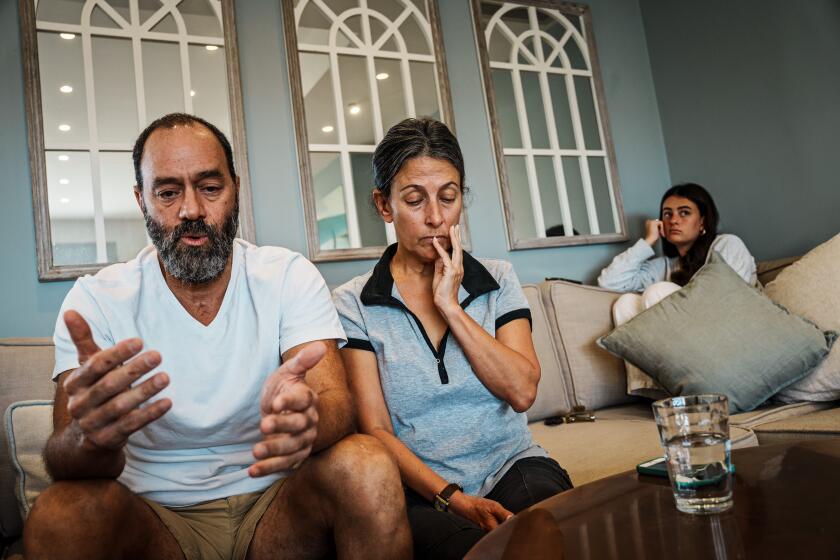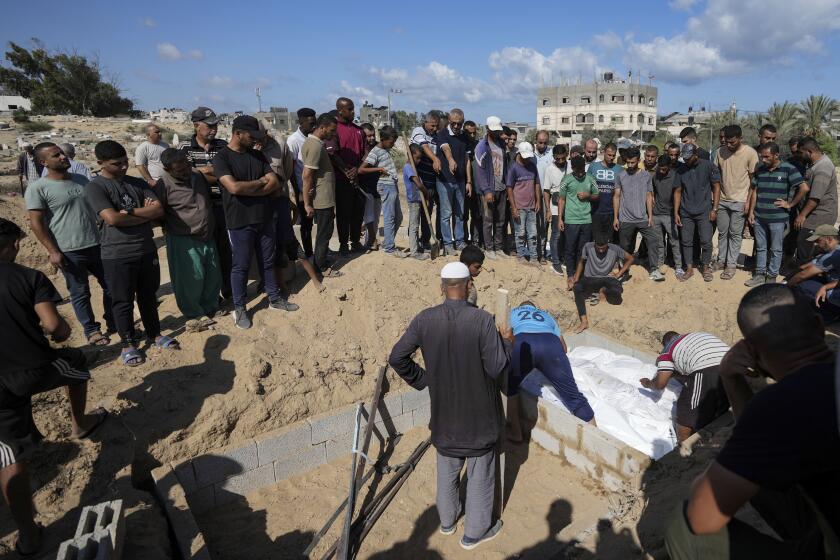Strikes and protests roil a divided Israel amid funerals for hostages, including California native

- Share via
TEL AVIV — Tearful funerals, furious political rhetoric, striking workers: Israel’s deep divisions over the war in Gaza were on full view Monday, galvanized by the killings of six Israeli hostages whose release had seemed tantalizingly within reach.
A day after the country learned of the deaths of the six, whose bodies were recovered over the weekend from a tunnel beneath southern Gaza, pressure intensified on Prime Minister Benjamin Netanyahu to strike an accord to free what may be dozens of living captives still held by Hamas and other Palestinian militants.
Israel said the latest hostages to die had been killed execution-style, shot at close range.
A full 36 hours after the army announced the identities of the slain hostages, Netanyahu, who had remained largely out of sight, surfaced Monday evening for a combative address to the nation.
He decried “huge international pressure” to make concessions unacceptable to Israel, including an Israeli pullback from a narrow strip of land between the borders of Egypt and Gaza.
But opposition to Netanyahu’s approach was palpably broadening.
For the first time since the war broke out nearly 11 months ago, Israel’s largest labor federation called a general strike to protest the lack of a hostage deal. By midafternoon, an Israeli court had curtailed the walkout, which had been observed unevenly across the country, causing some disruptions but falling well short of paralyzing work stoppages.
Instead, much of the country’s attention was fixated elsewhere: on a round of funerals scattered across the country. In Jerusalem, thousands turned out to pay tribute to Hersh Goldberg-Polin, a 23-year-old Berkeley native who was the only U.S. citizen among the six.
“Now I no longer have to worry about you — you are no longer in danger,” his mother, Rachel Goldberg, said in a eulogy addressed to her son.
Grief and anger in Israel as authorities say Hersh Goldberg-Polin, a native of Berkeley, and five other hostages were killed in Gaza. Many direct fury at Israeli Prime Minister Benjamin Netanyahu.
Referring to the final text message to his parents on Oct. 7, when he was taken hostage after fleeing a music festival that came under attack by Hamas-led militants, she said, “You wrote to us ‘I’m sorry,’ because you knew how crushing it would be for us to lose you. So you fought to stay alive.”
Wearing dark glasses, her voice steady and composed but occasionally close to breaking, Goldberg spoke of the “sickening feeling that we could not save them” — her son and the two women and three men killed alongside him. He was the youngest of the group; the eldest was 40.
“We hoped that perhaps a deal was near,” she said. “It tasted close, but it was not to be so.”
California native Hersh Goldberg-Polin, 23, hasn’t been seen by family since before Hamas’ attack on Israel. They’re determined to find him and bring him home.
Israeli news reports, citing official sources, said that at least three of the six hostages — Goldberg-Polin, Eden Yerushalmi and Carmel Gat — were on a list of the next tranche of captives to be released. But in July and August, the negotiations foundered, with many Israelis blaming Netanyahu for resisting an accord in favor of pressing ahead with a devastating war that aligned with his own political agenda.
The Israeli leader has reiterated his determination to crush Hamas, and lashed out at those insisting instead that saving the remaining hostages’ lives should be the main imperative.
In his evening appearance — billed as a news conference but in fact an hourlong lecture, complete with maps and a pointer — the prime minister called for national unity against a “cruel enemy,” insinuating that his political opponents were playing into the hands of the militants.
“The message is ‘Murder us, and we’ll compromise’?’’ he said, describing what he said militants would infer from Israel yielding under pressure. “Hamas wants us divided, weakened, defeated.”
Earlier, taking angry exception to Monday’s general strike, Netanyahu reportedly declared that the walkout would only serve to hearten Hamas leader Yahya Sinwar.
“It’s telling Sinwar, ‘You murdered six people. Here, we support you,’” Israeli news outlets cited the prime minister as telling Cabinet ministers.
His hard-line supporters in government made similar assertions. One of them, Finance Minister Bezalel Smotrich, said in a radio interview that the labor federation chief, Arnon Bar-David, was “making Sinwar’s dream come true.”
The labor federation said it would consider calling additional strikes in coming days. For several hours on Monday, the strike delayed some flight departures at Ben Gurion international airport, curtailed some nonemergency hospital services, and temporarily shut down light-rail systems in Jerusalem and Tel Aviv. Schools and some businesses were also affected.
An umbrella group representing hostage families also appealed for a continuation of the massive street protests in which thousands of people turned out in several Israeli cities Sunday night, in some of the largest such demonstrations since the war began.
Since the Oct. 7 attack in southern Israel in which militants killed about 1,200 people and took some 250 hostage, Netanyahu has insisted that Hamas must be destroyed. Israel’s subsequent attacks in Gaza have killed more than 40,000 Palestinians, according to health officials in the Hamas-run territory, destroyed much of the enclave and led to a humanitarian disaster.
With the death toll in Gaza over 40,000 after 10 months of the Israel-Hamas war, the small, densely packed Palestinian territory is crammed with bodies.
Some of the hostages have been released in an earlier pause in the fighting, others rescued or found dead. Israel believes that of about 100 hostages remaining in Gaza, around one-third are dead.
In Tel Aviv, as night fell Monday, a growing crowd of demonstrators, many waving Israeli flags, gathered near Israel’s defense ministry, demanding a hostage deal. Police hastily erected barricades outside the headquarters of Netanyahu’s Likud Party as chanting protesters massed outside.
More protesters assembled outside the prime minister’s residence in Jerusalem, carrying portraits of hostages living and dead, displaying yellow banners to symbolize the call for their freedom.
In Washington, President Biden gave a one-word answer when asked whether Netanyahu was doing enough to secure a deal for the hostages’ release.
“No,” he told reporters at the White House.
Asked if his administration would be presenting a final hostage accord to both sides, the president replied: “We’re very close to that.”
Vice President Kamala Harris, the Democratic presidential nominee, said in a statement that she and Biden had met with the U.S. team taking part in the talks. “It is long past time for a ceasefire and hostage deal,” she wrote on X.
In a grim coda, Hamas on Monday released a brief black-and-white video on the Telegram messaging app, showing each of the six hostages briefly identifying themselves, and signaled its intention to release a longer clip. It was unclear when the recordings were made.
In past months, Hamas has put out other videos showing other captives in custody. Israeli news outlets generally no longer air them, considering them propaganda meant to demoralize the public.
“We will show their last messages,” said a superimposed text. “Wait for us.”
More to Read
Sign up for Essential California
The most important California stories and recommendations in your inbox every morning.
You may occasionally receive promotional content from the Los Angeles Times.












